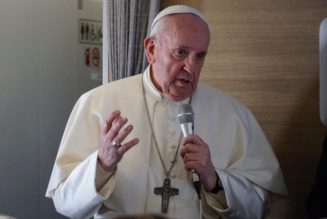
This past weekend, Pope Francis gave a speech where he stated:
It is true that every reform creates resistance. I remember, when I was a boy, when Pius XII began with the first liturgical reform, the first one: you can drink water before communion, fasting for an hour… “But that’s against the sanctity of the Eucharist!”, they rent their garments in despair. Then, the Vespers Mass: “But, how come, Mass is in the morning!”. Then, the reform of the Easter Triduum: “But how is it possible, on Saturday the Lord must rise, now they postpone it to Sunday, to Saturday evening, on Sunday they don’t ring the bells… And where do the twelve prophecies go?”. All these things scandalized closed minds. It also happens today. Indeed, these closed mindsets use liturgical matters to defend their own point of view. Using the liturgy: this is the drama we are experiencing in ecclesial groups that are distancing themselves from the Church, questioning the Council, the authority of the bishops… in order to preserve tradition. And the liturgy is used for this.
I read that and thought to myself, “What if this was a first draft? What could a second draft have looked like?”
And so, if Pope Francis wants to hire me as his speechwriter, here’s my second draft.
The Second Draft
It is true that every reform creates resistance. I remember, when I was a boy, when Pius XII began with the first liturgical reform, the first one: you can drink water before communion, fasting for an hour… “But that’s against the sanctity of the Eucharist!” What a beautiful response. We may have expected that the faithful would rejoice to have a lighter burden placed upon them by Holy Mother Church. But is their response to rejoice? No! They don’t think of themselves first, they think of Our Lord and the love they have for Him in the Eucharist. Brother priests, how this response should make us rejoice! Yes, there are many Catholics who will not speak up against any reforms, but not because they agree with them, but rather because they have ceased listening to the Church at all!
We may be tempted, brother priests and bishops, to scoff at these faithful and to demand of them, “You question the authority given me by the Church?” Yes, there may be some who question the authority of the bishops or councils, but far more common is the faithful man or woman who questions, yes, but not because they lack belief in authority, but because they lack understanding of the reform, and seek to understand. I am reminded of Nicodemus who questions Our Lord how he could be born again. He asked this not to deny Our Lord’s authority, but to understand. And see how Our Lord patiently explains to Him the meaning of the whole Incarnation in His declaration that “God so loved the world that he gave his only Son.”
Yes brothers, reforms—even good and necessary ones—must acknowledge that there are those who are attached to ancient practices of the Church. And why? Because the faithful love them! And why do they love them? Because Holy Mother Church gave them to her children and asked her children to love them! Shall we despair and rend our garments when we find the faithful questioning us over the things they love the most in all the world? For my part, I answer you: this is a sign of hope. It is a sign that someone is deeply in love with the Church’s rich treasury of beauty and goodness.
Remember, we are called to be spiritual fathers to the faithful. Imagine a father who has told his children for years of a certain way to honor their mother, and how much their mother loves this way of honoring her. Now imagine the father tells his children that this way of honoring their mother must change. Would we be surprised to hear the children question their father? No! For they have believed their father and believed what he said was true, and now, though they question not their father’s authority, they do seek to understand why their mother may no longer be honored in this way. The father, if he is to be a good father, offering his sons bread and not stones, will patiently and lovingly explain to his children the reason for the change, and how their mother may be better honored now. For, brother priests, those seeking Truth, always, yes, always, seek it out because of love.
So then, my dear brother bishops, let us be that which we are: Alter Christus. See how He answers the rich young man who questions Him (“And Jesus looking on him, loved him”). Let us take Him for our model when we are asked questions of the faithful: to first, before all else, look upon the faithful—and love them.
Join Our Telegram Group : Salvation & Prosperity









